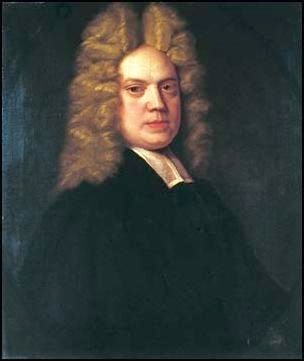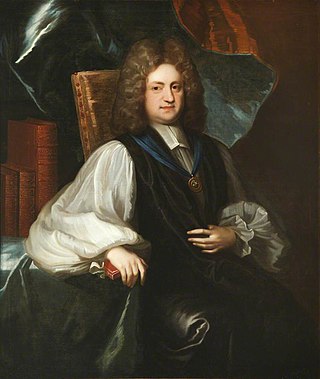
Jacobitism (Scots: Jacobitism was a political movement that supported the restoration of the senior line of the House of Stuart to the British throne. The name derives from the first name of James II and VII, which in Latin translates as Jacobus. When James went into exile after the November 1688 Glorious Revolution, the Parliament of England argued that he had abandoned the English throne, which they offered to his Protestant daughter Mary II, and her husband William III. In April, the Scottish Convention held that he "forfeited" the throne of Scotland by his actions, listed in the Articles of Grievances.
The Whigs were a political faction and then a political party in the Parliaments of England, Scotland, Ireland, Great Britain and the United Kingdom. Between the 1680s and the 1850s, the Whigs contested power with their rivals, the Tories. The Whigs merged into the Liberal Party with the Peelites and Radicals in the 1850s. Many Whigs left the Liberal Party in 1886 to form the Liberal Unionist Party, which merged into the Conservative Party in 1912.

Francis Atterbury was an English man of letters, politician and bishop. A High Church Tory and Jacobite, he gained patronage under Queen Anne, but was mistrusted by the Hanoverian Whig ministries, and banished for communicating with the Old Pretender in the Atterbury Plot. He was a noted wit and a gifted preacher.

Henry Sacheverell was an English high church Anglican clergyman who achieved nationwide fame in 1709 after preaching an incendiary 5 November sermon. He was subsequently impeached by the House of Commons and though he was found guilty, his light punishment was seen as a vindication and he became a popular figure in the country, contributing to the Tories' landslide victory at the general election of 1710.

The Priestley Riots took place from 14 July to 17 July 1791 in Birmingham, England; the rioters' main targets were religious dissenters, most notably the politically and theologically controversial Joseph Priestley. Both local and national issues stirred the passions of the rioters, from disagreements over public library book purchases, to controversies over Dissenters' attempts to gain full civil rights and their support of the French Revolution.
The Tories were a loosely organised political faction and later a political party, in the Parliaments of England, Scotland, Ireland, Great Britain and the United Kingdom. They first emerged during the 1679 Exclusion Crisis, when they opposed Whig efforts to exclude James, Duke of York from the succession on the grounds of his Catholicism. Despite their fervent opposition to state-sponsored Catholicism, Tories opposed exclusion in the belief inheritance based on birth was the foundation of a stable society.

The Occasional Conformity Act, also known as the Occasional Conformity Act 1711 or the Toleration Act 1711, was an Act of the Parliament of Great Britain which passed on 20 December 1711. Previous Occasional Conformity bills had been debated in 1702 and 1704, the latter causing the 'Tackers' controversy. It was passed by the Tories to undermine the Whig party, and to ensure that elections to Parliament were under the control of Tories, with non-conformists locked out. It applied to any national or local official in England or Wales who was required to attend Church of England services and take the Lord's Supper. If such a person attended "any conventicle, assembly or meeting" of any other religion, they would be subject to a penalty of £40 and permanently barred from government employment.

Richard Onslow, 1st Baron Onslow PC, known as Sir Richard Onslow, 2nd Baronet from 1688 until 1716, was a British Whig politician who sat in the English and British House of Commons from 1679 to 1715. He was Speaker of the House of Commons from 1708 to 1710 and Chancellor of the Exchequer from 1714 to 1715. Onslow was a very unpopular figure amongst members of both political parties, particularly during his time as Speaker. He was extremely pedantic and showed an absolute devotion to principle, as a result, he was given the nickname "Stiff Dick".
Jonathan Smedley (1671–1729) was an Anglo-Irish churchman who became Dean of Clogher in 1724. He was an opportunist and satirical victim who engaged in a polemic with Jonathan Swift and the forces of the Tory party.

The 1710 British general election produced a landslide victory for the Tories. The election came in the wake of the prosecution of Henry Sacheverell, which had led to the collapse of the previous government led by Godolphin and the Whig Junto.

Charles Trimnell (1663–1723) was an English bishop. He was a Whig in politics, and known for his attacks on High Church views, writing on the subordination of the Church of England to the state. After the accession of George I of Great Britain in 1714 he was in the royal favour and influential.

Joseph Trapp (1679–1747) was an English clergyman, academic, poet and pamphleteer. His production as a younger man of occasional verse and dramas led to his appointment as the first Oxford Professor of Poetry in 1708. Later his High Church opinions established him in preferment and position. As a poet, he was not well thought of by contemporaries, with Jonathan Swift refusing a dinner in an unavailing attempt to avoid revising one of Trapp’s poems, and Abel Evans making an epigram on his blank verse translation of the Aeneid with a reminder of the commandment against murder.
Richard West (1670?–1716) was an English churchman and academic, and was archdeacon of Berkshire from 1710.

Samuel Wright (1683–1746) was an English dissenting minister.
General Daniel Harvey was a British soldier and politician who was Governor of Guernsey from 1714 to 1732.

Scottish religion in the eighteenth century includes all forms of religious organisation and belief in Scotland in the eighteenth century. This period saw the beginnings of a fragmentation of the Church of Scotland that had been created in the Reformation and established on a fully Presbyterian basis after the Glorious Revolution. These fractures were prompted by issues of government and patronage, but reflected a wider division between the Evangelicals and the Moderate Party. The legal right of lay patrons to present clergymen of their choice to local ecclesiastical livings led to minor schisms from the church. The first in 1733, known as the First Secession and headed by figures including Ebenezer Erskine, led to the creation of a series of secessionist churches. The second in 1761 led to the foundation of the independent Relief Church.

The coronation riots of October 1714 were a series of riots in southern and western England in protest against the coronation of the first Hanoverian king of Great Britain, George I.

In the spring and summer of 1715 a series of riots occurred in England in which High Church mobs attacked over forty Dissenting meeting-houses. The rioters also protested against the first Hanoverian king of Britain, George I and his new Whig government. The riots occurred on symbolic days: 28 May was George I's birthday, 29 May was the anniversary of Charles II's Restoration and 10 June was the birthday of the Jacobite Pretender, James Francis Edward Stuart.
'Church in Danger' was a political slogan used by the Tory party, and particularly by High Tories in elections during Queen Anne's reign.
Sir John Lade, 1st Baronet (1662–1740) was an English brewer and politician who sat in the House of Commons between 1713 and 1727.












